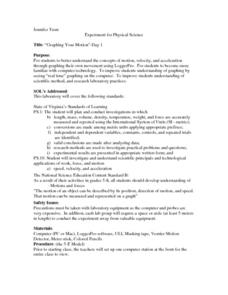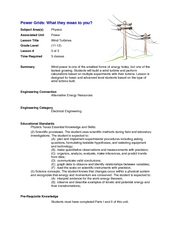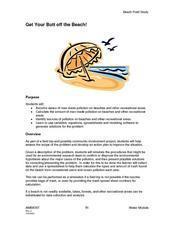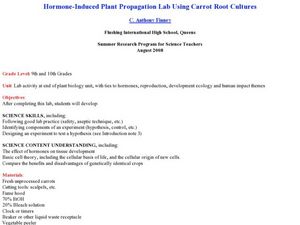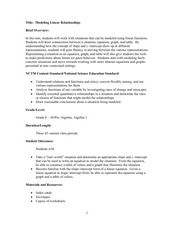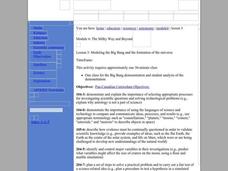Curated OER
Seasons' Journey: As the World Turns
Fourth graders explore the earth's revolution around the sun and the changes in weather that follow this motion.
Curated OER
Marine Animals on the Move
Young scholars complete a project based on collecting satellite data aimed at finding connections between organisms and the environment. They create a final project working with a partner to share with the class.
Curated OER
Graphing Your Motion-Day 1
Ninth graders explore the concepts of motion, velocity and acceleration through graphing their own movement using LoggerPro. They become more familiar with the computer technology. Students explore graphing in real time and graph on...
Curated OER
Hazard Mitigation: Bioterrorism
High schoolers discuss different ways to spread infectious diseases. In this bioterrorism lesson, students model the rate of smoke emission using CalRoad software. They analyze the effects of airborne release of...
Curated OER
Wind Turbines
Students build their own wind turbine. In this physics lesson, students calculate the power output of their wind turbines. They evaluate their design and make the necessary modifications.
Curated OER
Physical Difference and Classification
Students use a microscope and observation skills to compare and contrast several physical properties and develop a classification system.
Curated OER
Lotic Environment
High schoolers assemble a classroom river model as an example of a lotic system. They control and measure biotic and abiotic information for the in-class system and compare data with a lotic system in a natural environment.
Curated OER
Get Your Butt off the Beach!
Students participate in a Beach Field Study in which the analyze the affect pollution is having on beaches and the animals that live there. Students focus specifically on the damage cigarette butts are causing on the environment.
Curated OER
Lotic Environment Lesson Plans
High schoolers create and conduct experiments on a "classroom river habitat." They manipulate the biotic and abiotic factors so that they are able to compare an artificially prepared river model to a naturally occurring lotic ecosystem.
Curated OER
Determining Momentum and Energy Loss of Balls Colliding Against Different Surfaces
Students experiment with the bounce of balls on various surfaces. In this physics lesson, students use various surfaces to bounce balls to study the momentum. This hands-on activity with the concepts of elasticity of surfaces which is...
Curated OER
Hormone-Induced Plant Propagation Lab using Carrot Root Cultures
Young scholars evaluate the importance of hormones in living things. In this biology lesson, students experiment on carrots to differentiate how humans and plants reproduce. They collect data from experiment to answer analysis questions.
Curated OER
Lab Experiments in Nutrition
Looking for authentic hands-on nutritional experiments? High schoolers will perform experiments to test for the presence of vitamin C in several solutions as well as the effect of caffeine on Daphnia. They will also consider the...
Alabama Learning Exchange
Human Slope
Middle and high schoolers explore the concept of slope. For this slope lesson, learners graph lines using a life-size graph. They use chalk on a blacktop to create a coordinate plane and use each other as the tick marks on the grid....
Discovery Education
Cushion It!
Sugar cubes, collide! Groups design protection systems using bubble wrap to protect sugar cubes from being destroyed by falling batteries in the STEM lesson. They consider how the experiment relates to collisions in real-world...
Kenan Fellows
Using Water Chemistry as an Indicator of Stream Health
Will this water source support life? Small groups test the chemistry of the water drawn from two different sources. They then compare the collected data to acceptable levels to draw conclusions about the health of the source. The...
Kenan Fellows
Effects of a Golf Course on Stream Health
Is the golf course causing issues in the stream? Find out with a resource that has groups perform chemical water tests to analyze the effects of a golf course on a stream. Pupils collect water above and below the course and analyze the...
Curated OER
Equivalent or Not Equivalent?
Algebra learners look at equivalent expressions in the context of three different operations: division, squaring, and absolute value. In comparing these values, they will identity when expressions are equivalent.
Teach Engineering
Club Function
Let's get the herd to follow the rules. The activity associated with the second lesson in the unit introduces the class to the definition of a function. Individuals must gather in groups of zebras and rhinos defined by the general...
PBS
Predicting/Making a Hypothesis
As an introduction to the hypothesis and testing method of investigation, young history detectives engage in a special investigation of a family artifact. After watching a short video that demonstrates the method, they develop a...
Curated OER
Interpreting Data from Birdfeeders
What kinds of birds live in your area? Read a book about birds to your learners and explore their feeding patterns. Charts and graphs are provided in this three page packet, but consider assigning the basic questions if using with young...
Curated OER
How Alike Are We?
Fourth graders find the range, mode, median, and mean for each of the data sets (height and shoe size). They discuss which measure of central tendency for each data set best represents the class and why. Students graph the shoe size and...
Curated OER
Modeling Linear Relationships
Students graph lines using the slope and y-intercept. In this algebra lesson, students create data using tables and equations. They use their data to make predictions and draw conclusion.
Curated OER
Changes in Force, Motion, and Energy
Eighth graders construct various machines and compare the work done by them.
Curated OER
The Big Bang Theory
Students will use scientific reasoning to formulate ideas about the formation of the universe using the Big Bang Theory. The use of critical thinking skills is part of the activity and the foundation of the scientific method will serve...




